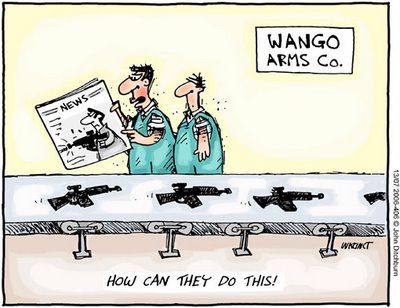Guerres et conflits = excellente busine$$
Suite à mon dernier article, ce puissant texte du Prof. Ismael Hossein-zadeh publié sur Global Research, vient expliquer et détailler ce que je présentais comme information; c`est-à-dire que les guerres sont juste des prétextes à enrichissement énorme pour la classe dirigeante. La guerre, dans notre système économique, est une opportunité incroyable de faire beaucoup d`argent, la guerre est une très excellente business, une affaire d`or dont on ne pourrait se passer.
Si vous n`avez pas le courage de lire cet article en long, prière de lire au moins les passages que j`ai ici tiré du texte disponible sur Global Research.
À lire!
Why the US Is Not Leaving Iraq: The Booming Business of War Profiteers
In light of the fact that by now almost all of the factions of the ruling circles, including the White House and the neoconservative war-mongerers, acknowledge the failure of the Iraq war, why, then, do they balk at the idea of pulling the troops out of that country?
Perhaps the shortest path to a relatively satisfactory answer would be to follow the money trail.
Posted Jan 15, 2007 09:31 AM PSTCategory: IRAQ
The defense contractors are the only folks "winning" in these interminable wars, just as it happened in Viet Nam.
Global Research, January 12, 2007
by Prof. Ismael Hossein-zadeh
The military-industrial-complex [would] cause military spending to be driven not by national security needs but by a network of weapons makers, lobbyists and elected officials. — Dwight D. Eisenhower
There are only two things we should fight for. One is the defense of our homes and the other is the Bill of Rights. War for any other reason is simply a racket. — General Smedley D. Butler
Perhaps the shortest path to a relatively satisfactory answer would be to follow the money trail. The fact of matter is that not everyone is losing in Iraq. Indeed, while the Bush administration’s wars of choice have brought unnecessary death, destruction, and disaster to millions, including many from the Unites States, they have also brought fortunes and prosperity to war profiteers. At the heart of the reluctance to withdraw from Iraq lies the profiteers’ unwillingness to give up further fortunes and spoils of war.
Pentagon contractors constitute the overwhelming majority of these profiteers. They include not only the giant manufacturing contractors such as Lockheed Martin, Northrop Grumman and Boeing, but also a complex maze of over 100,000 service contractors and sub-contractors such as private army or security corporations and "reconstruction" firms.[1] These contractors of both deconstruction and "reconstruction," whose profits come mainly from the US treasury, have handsomely profited from the Bush administration’s wars of choice.
The Pentagon contractors are both as a major driving force to the war on Iraq and a major obstacle to the withdrawal of US led forces.
Fantastic returns to these armaments conglomerates have been reflected in the continuing jump in the value of their shares or stocks in the Wall Street: "Shares of U.S. defense companies, which have nearly trebled since the beginning of the occupation of Iraq, show no signs of slowing down. . . . All the defense companies—with very few exceptions—have been doing extremely well with mostly double-digit earnings growth. . . . The feeling that makers of ships, planes and weapons are just getting into their stride has driven shares of leading Pentagon contractors Lockheed Martin Corp., Northrop Grumman Corp., and General Dynamics Corp. to all-time highs. . . ."[3]
Major beneficiaries of war dividends include not only the giant manufacturing contractors such as Northrop Grumman and Lockheed Martin, but also a whole host of other war-induced service contractors that have mushroomed around the Pentagon and the Homeland Security apparatus in order to cash in on the Pentagon’s spending bonanza.
For example, in the same month (October 2006) that the US forces lost a record number of soldiers in Iraq, and the Iraqi citizens lost many more, Halliburton announced that its third quarter revenue had risen by 19 percent to $5.8 billion. This prompted Dave Lesar, the company’s chairman, president and CEO, to declare, "This was an exceptional quarter for Halliburton."
Jeff Tilley, an analyst who does research for Halliburton, likewise pointed out, "Iraq was better than expected. . . . Overall, there is nothing really to question or be skeptical about. I think the results are very good."
The fact that powerful beneficiaries of war dividends flourish in an atmosphere of war and international convulsion should not come as a surprise to anyone. What is surprising is that, in the context of the recent US wars of choice, these beneficiaries have also acquired the power of promoting wars, often by manufacturing "external threats to our national interest." In other words, profit-driven beneficiaries of war have also evolved as war makers, or contributors to war making.[9]
The following is a sample of such unsavory business–political relationships, as reported by Walter F. Roche and Ken Silverstein in a 14 July 2004 Los Angeles Times article, titled "Advocates of War Now Profit from Iraq’s Reconstruction:"
• Former CIA Director R. James Woolsey is a prominent example of the phenomenon, mixing his business interests with what he contends are the country's strategic interests.
• Neil Livingstone, a former Senate aide who has served as a Pentagon and State Department advisor and issued repeated public calls for Hussein's overthrow. He heads a Washington-based firm, GlobalOptions, Inc. that provides contacts and consulting services to companies doing business in Iraq.
• Randy Scheunemann, a former Rumsfeld advisor who helped draft the Iraq Liberation Act of 1998 authorizing $98 million in U.S. aid to Iraqi exile groups. He was the founding president of the Committee for the Liberation of Iraq. Now he's helping former Soviet Bloc states win business there.
• Margaret Bartel, who managed federal money channeled to Chalabi's exile group, the Iraqi National Congress, including funds for its prewar intelligence program on Hussein's alleged weapons of mass destruction. She now heads a Washington-area consulting firm helping would-be investors find Iraqi partners.
• K. Riva Levinson, a Washington lobbyist and public relations specialist who received federal funds to drum up prewar support for the Iraqi National Congress. She has close ties to Bartel and now helps companies open doors in Iraq, in part through her contacts with the Iraqi National Congress.
• Joe M. Allbaugh, who managed President Bush's 2000 campaign for the White House and later headed the Federal Emergency Management Agency, and Edward Rogers Jr., an aide to the first President Bush, recently helped set up New Bridge Strategies and Diligence, LLC to promote business in postwar Iraq.[10]
There are strong indications that these dubious relationships represent more than simple cases of sporadic or unrelated instances of some unscruplulous or rogue elements. Evidence shows that contracts for the "reconstruction" of Iraq were drawn long before the invasion and deconstruction of that country had started. In a fascinating report for The Nation magazine, titled "The Rise of Disaster Capitalism," Naomi Klein describes such long-projected "rebuilding" schemes as follows:
"Last summer, in the lull of the August media doze, the Bush Administration's doctrine of preventive war took a major leap forward. On August 5, 2004, the White House created the Office of the Coordinator for Reconstruction and Stabilization, headed by former US Ambassador to Ukraine Carlos Pascual. Its mandate is to draw up elaborate ‘post-conflict’ plans for up to twenty-five countries that are not, as of yet, in conflict. According to Pascual, it will also be able to coordinate three full-scale reconstruction operations in different countries ‘at the same time,’ each lasting ‘five to seven years.’"[11]
Here we get a glimpse of the real reasons or forces behind the Bush administration’s preemptive wars. As Klein puts it, "a government devoted to perpetual pre-emptive deconstruction now has a standing office of perpetual pre-emptive reconstruction." Klein also documents how (through Pascual’s office) contractors drew "reconstruction" plans in close collaboration with various government agencies and how, at times, contracts were actually pre-approved and paper work completed long before an actual military strike[...]
No business model or entrepreneurial paradigm can adequately capture the nature of this kind of scheming and profiteering. Not even illicit businesses based on rent-seeking, corruption or theft can sufficiently describe the kind of nefarious business interests that lurk behind the Bush administration’s preemptive wars. Only a calculated imperial or colonial kind of exploitation, albeit a new form of colonialism or imperialism, can capture the essence of the war profiteering associated with the recent US wars of aggression. As Shalmali Guttal, a Bangalore-based researcher put it, "We used to have vulgar colonialism. Now we have sophisticated colonialism, and they call it 'reconstruction.'"[12]














